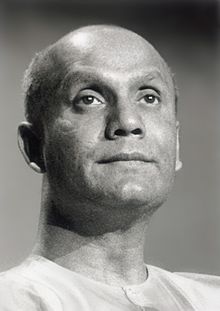Chinmoy
| Sri Chinmoy | |
|---|---|
 |
|
| Born |
27 August 1931 Shakpura Village, Chittagong District, East Bengal, British India (now Bangladesh) |
| Died | 11 October 2007 (aged 76) New York City |
| Resting place | Queens, New York |
| Nationality | Indian |
| Signature | |
 |
|
Chinmoy Kumar Ghose, better known as Sri Chinmoy (27 August 1931 – 11 October 2007), was an Indian spiritual leader who taught meditation in the West after moving to New York City in 1964. Chinmoy established his first meditation center in Queens, New York, and eventually had 7,000 students in 60 countries. A prolific author, artist, poet, and musician, he also held public events such as concerts and meditations on the theme of inner peace. Chinmoy advocated a spiritual path to God through prayer and meditation. He also advocated athleticism including distance running, swimming, and weightlifting. He organized marathons and other races, and was an active runner and, following a knee injury, weightlifter.
Chinmoy was the youngest of seven children, born in Shakpura, Boalkhali Upazila, in the Chittagong District of East Bengal (now Bangladesh). He lost his father to illness in 1943, and his mother a few months later. In 1944, the 12-year-old Chinmoy joined his brothers and sisters at the Sri Aurobindo Ashram in Pondicherry, where elder brothers Hriday and Chitta had already established a presence.
There he spent the next 20 years in spiritual practice, including meditation, study in Bengali and English literature, and work in the ashram's cottage industries. Chinmoy claimed that for about eight years, he was the personal secretary to the General Secretary of the ashram, Nolini Kanta Gupta. Chinmoy translated his writings from Bengali into English.
According to Chinmoy, in 1964 he was prompted to move to the United States in response to a "message from within" to be of service to people in the West searching for spiritual fulfillment. With the help of Sam Spanier and Eric Hughes, American sponsors connected with the Sri Aurobindo Ashram, he emigrated to New York City.
He successfully applied for a job as junior clerk at the Indian consulate, despite his lack of formal education. He received support and encouragement from his colleagues and bosses and was invited to give talks on Hinduism. He started to give talks at universities and later, at the United Nations.
...
Wikipedia
